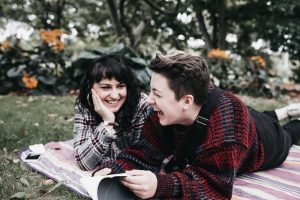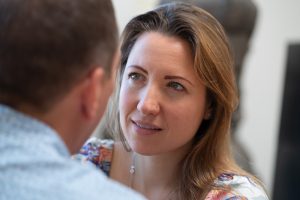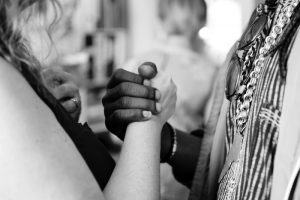How we define family may depend on our circumstances and, in whatever form, having people in our life that we consider family is important to our basic survival and overall well-being.
According to a 2008 report by the Pew Research Center, 57% of American adults haven’t left the state that they grew up in and live within an hour of extended families. The overwhelming reason that people stay put is for their family ties. Having family nearby can take some of the pressure off when raising kids, juggling job responsibilities and dealing with life’s challenges. Many find comfort in the bonds of blood family and believe that their family of origin knows them in a way that a non-blood related person can’t.
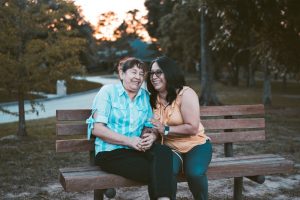
I think that there is some truth to that – when biological parents and siblings have been with you for the duration of your life, they know aspects of you that others don’t. There can be great comfort in that. And, the truth is that many of us have an uncomfortable or distant relationship with the family we were born into…for many reasons.
When I left my conservative Midwest home for Berkeley in 1982, it was ostensibly to attend graduate school, and the reality is that I chose my school very deliberately. I had a strong desire to get as far away as possible from my parents so that I could learn and grow without their influence. While we shared certain fundamental values, I was politically and socially much more liberal and adventurous than all of my blood relations and once I got to the West Coast I became even more so.
Going through a difficult divorce about 15 years later, I realized that I could not really rely on my family back home for the support I sorely needed. They didn’t understand what I was going through because they hadn’t been there along the way. They certainly were not going to understand that I had recently identified myself as bi-sexual and non-monogamous. And the fact that they were all 3,000 miles away made any practical help, well, impractical. I was fortunate to be able to turn to a group of friends that somehow along the way had become my “west coast family”. These deep friendships provided me with emotional and practical support during a really challenging time.
And, while over the years I have continued to grow and rely on my chosen family, I am lucky to still have a strong connection to my biological siblings, nieces, nephews and my current blended family. My chosen family certainly enhances my life but, for me, it is more like a ‘bonus family’. For many, however, especially our LBGTQ+ youth, creating a chosen family can be a matter of survival.
Recent national studies have estimated that while about 7% of US youth are LGBTQ+, 40% of homeless youth identify as LGBTQ+. LGBTQ+ young people are 120% more likely to experience homelessness than non-LGBTQ+ youth. The severe loneliness and isolation experienced when people that identify as LGBTQ are outright rejected by biological kin is a known issue, contributing to depression, drug/alcohol abuse, and dysfunction. For these young people, chosen families can provide a much-needed support system, financial assistance, somewhere to sleep and unconditional love. My younger brother was estranged from our family for years before he died from complications due to alcoholism and AIDS in 1990. I cannot help but think that if he had found even a few people that he could have called ‘family’, he might still be alive today.
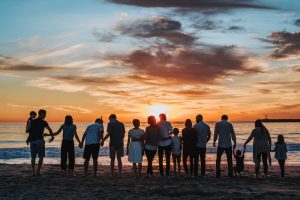 “We don’t need to be related to relate
“We don’t need to be related to relate
We don’t need to share genes or a surname
You are, you are…
My chosen
Chosen family.”
~Rina Sawayama from her song “Chosen Family” on her album Sawayama
The reality is that the traditional heteronormative family structure is not appealing or applicable to most LGBTQ+ people. And yet the kind of love, acceptance and support that a close-knit community provides is, of course, still essential.
Developing a chosen family can also be an important component of longer term self-care. In the developed and developing world, aging adults represent the fastest-growing segment of the population, and by 2030 more than 20% of the US population will be over sixty. Regardless of sexual orientation or gender identity, so-called Boomers (born between 1946 and 1964) have the same fears about aging, are similarly struggling with finances, and have similar desires for end-of-life care at home. In the general population, trends toward not marrying or having children mean that many find themselves without traditional family support as they age. Interestingly, older LGBTQ+ people are much more reliant on close friends than the general population. (Roughly 64 percent of LGBTQ+ Boomers have built and rely on chosen families versus 40% of the general population.)
People around the world are coming up with various ways of creating community to see themselves through their later years. Building intentional communities of people that share similar interests, values and lifestyles while you are younger can provide a crucial support network in your later years. And, bring you lots of joy along the way.
It can be empowering to consciously choose the people in your life who will be with you through thick and thin. Whether or not you have a close relationship with your biological family, building a close circle of friends that are your ‘chosen family’ can provide support and companionship throughout your life.
People usually come to our workshops to learn and grow and they often end up finding the kind of love and acceptance that they have been yearning for.
It takes effort to nurture what people call ‘chosen families’ – but it is well worth it!
****
About the author: Susan Chettle Rutherford has served on the HAI workshop team since 2009. She is also a writer and Certified Professional Co-Active Coach. Susan is absolutely passionate about helping people manifest lives of joy, love, abundance and fulfillment. Since she can remember, Susan has been committed to personal growth, and her biggest joy is being a facilitator of transformation in others. These days Susan is also on the Marketing team for HAI Global, helping them spread their message of love around the world.
About the editor: Kate Gillispie is the Marketing Director for HAI Global and co-host of May I Have This Dance, a podcast about love, intimacy, and sexuality. Find the podcast by searching for ‘May I Have This Dance‘ on iTunes, Google Podcasts, or wherever else you find your podcasts. You can also join our active community on Facebook.
****
HAI Global (HAI) holds a bold vision of a world where people live in dignity, respect, understanding, trust, kindness, compassion, reverence, honesty and love. We offer many online and in-person workshops designed to support you on your journey towards greater love and connection in your life. We hope to see you soon!

